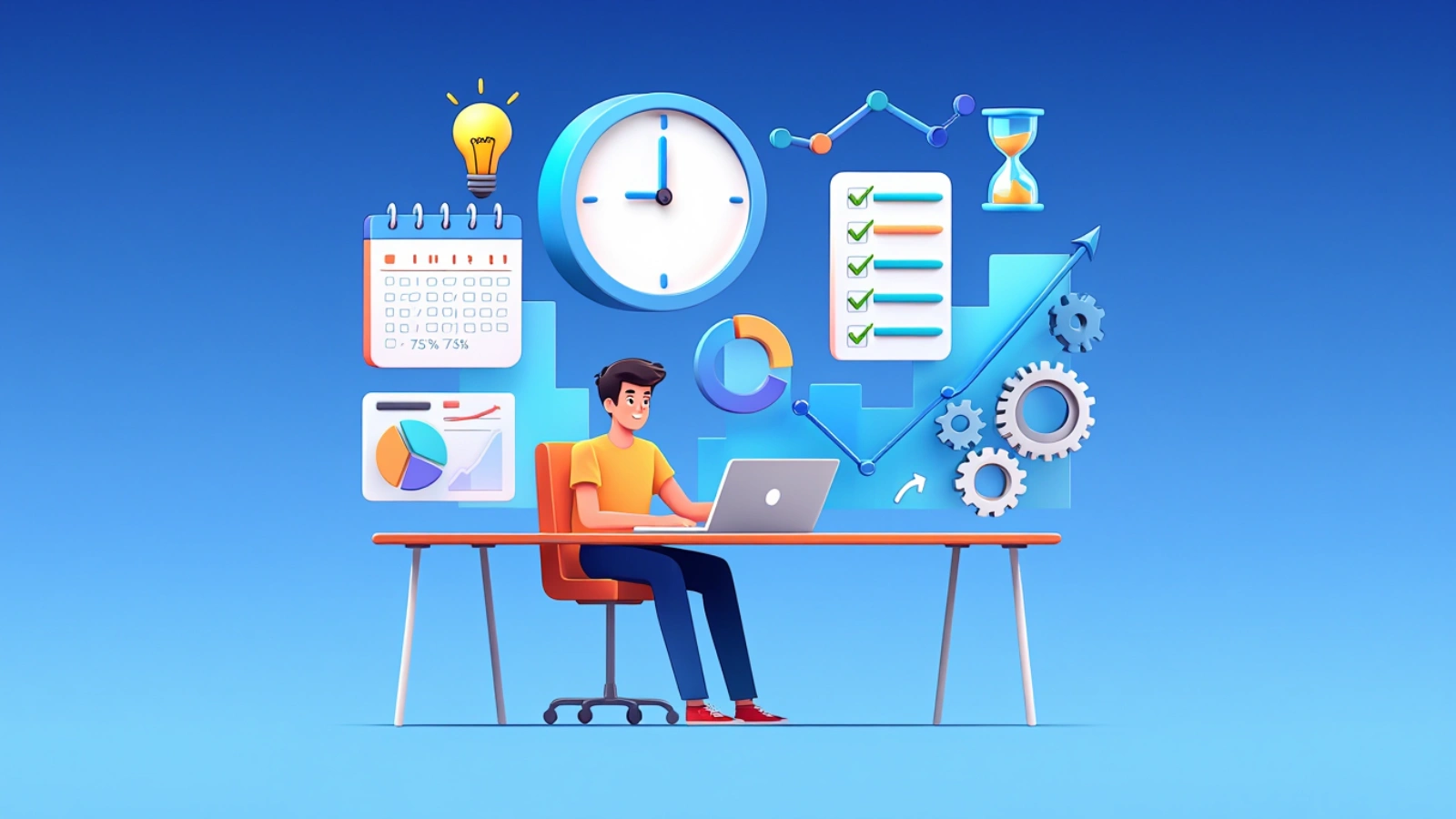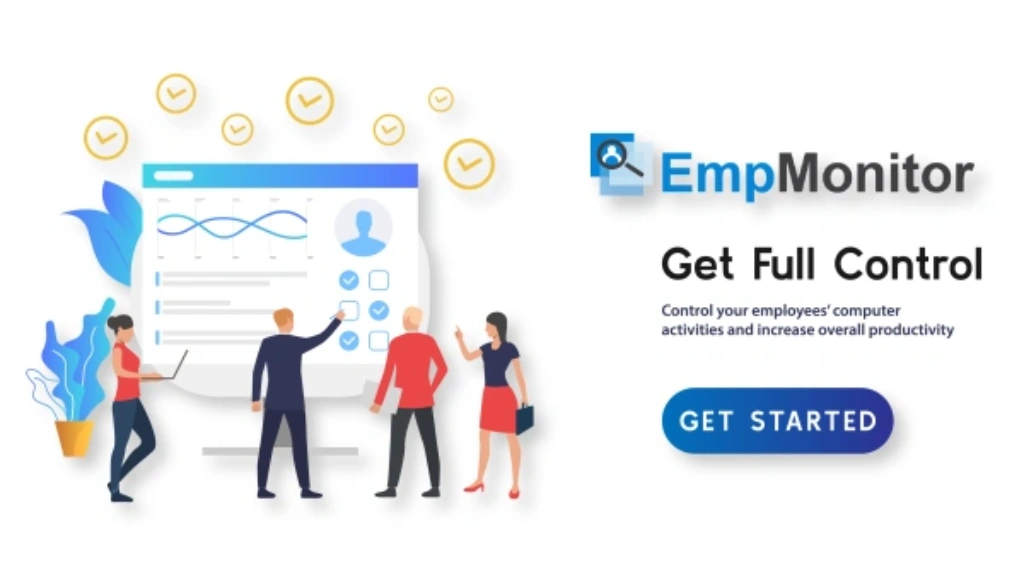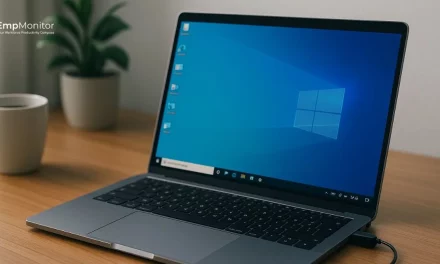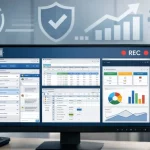In 2025, managing time has become more important than ever. With more work happening online and more tasks to handle every day, it is easy to lose track of time or feel unproductive. Time management tools are made to help you plan better, stay focused, and get things done without feeling overwhelmed.
These tools can help you organize your day, track how you spend your time, and remind you of what needs to be done.
In this blog, you will learn:
- What do time management tools mean
- The best time management tools in 2025
- How time task management tools help with daily planning
- How to use time tracking software to improve focus
- Tips to choose the right tool and use it the right way
This guide is useful for anyone who wants to work better, save time, and stay organized, whether you are working from home, managing a team, or just trying to get through your to-do list.
In a hurry? Listen to the blog instead!
What Is Time Management Tools?
Time management means using your time in a smart and organized way. It’s about managing workflow planning, setting priorities, and making sure you are working on the right things at the right time.
In simple words, it helps you finish more work in less time without feeling stressed.
Why It’s More Important Now
In 2025, many of us will work from home, switch between tasks all day, and deal with constant distractions from phones, emails, and notifications. It is easy to feel like the day just drops away.
That is why managing time well has become a skill everyone needs, not just at work, but in daily life too. Whether you are a student, freelancer, office worker, or business owner, better time management tools help you:
- Get more done
- Avoid last-minute stress
- Stay focused on what matters
- Have more free time for yourself
Good time management tool is not about doing everything. It is about doing what’s most important, and using the right tools can make that a lot easier.
The Basic Principles Of Time Management
Managing your time well starts with a few basic rules. These principles are simple but make a big difference in how productive and stress-free your day feels.
Here are the key principles of time management:
Plan before you start.
Always begin your day or week with a plan. This helps you know what needs to be done and when to do it.
Set clear priorities
Not every task is equally important. Focus on tasks that are urgent or have the most impact. It’s better to finish the most important things than to try doing everything at once.
Break big tasks into smaller steps.
Large tasks can feel overwhelming. Split them into smaller parts to make them easier to start and finish.
Use a schedule or time blocks.
Don’t leave tasks floating around in your head. Block time on your calendar for each task, break, or meeting so you stay on track.
Avoid multitasking
Doing too many things at once can slow you down. Focus on one task at a time to get better results.
Review your time regularly.
Look back at how your time was spent. Tools with tracking features can help you see where your time is going and where you can improve.
Stay flexible, but disciplined.
Life does not always go as planned, so stay open to changes, but try to follow your schedule as closely as possible.
The Importance Of Time Management Tools In Productivity
Time management tools are apps or software that help you plan, organize, and track your time. Instead of trying to remember everything or write it down on paper, these tools make it easier to manage your tasks and daily schedule in one place.
How Do These Tools Help?
Organize your tasks: Write down what you need to do, choose when you want to finish each thing, and make big jobs easier by breaking them into small steps.
Plan your day or week: Many tools let you create daily or weekly plans so you always know what to focus on.
Track how you spend time: With time tracking software, you can see where your time is going, which tasks take the most time, and where you might be wasting it.
Set reminders and alerts: These tools can remind you of important tasks or help you stay on schedule.
Stay focused: Some apps block distractions or use timers (like the Pomodoro method) to help you focus better.
Why Is It So Important in 2025?
Most people have to manage different tasks, switch between meetings, and balance work with personal time. Without a tool to help, it is easy to forget things or lose focus.
Using good time management tools can help you:
- Get your work done faster
- Avoid missing deadlines
- Reduce stress
- Create more free time
It is not just about working harder; these tools are about working smarter. And the right tool can help you do that.
Also Read!
Here is Why You Should Opt Macro-managing Over Micromanaging
The Best Tool for Time Management, Tools & Team Productivity
There are many time and task management tools out there, but not all of them work the same. Some are better for planning, some for tracking, and some for managing both time and tasks in one place.
That is why many businesses consider EmpMonitor the best solution.
EmpMonitor is an employee monitoring and productivity management tool that is designed mainly for teams, businesses, and remote work environments.
While its main focus is tracking employee activity during work hours, it also includes features that help with time management, performance tracking, and workflow optimization.
It gives managers and team members a clear view of how work time is being used, so that everyone can stay on track and work more efficiently.
Key Features Of EmpMonitor
Here’s what EmpMonitor can do:
Time Tracking & Activity Monitoring
- Tracks the time spent on tasks, apps, websites, and tools
- Records active and idle hours to show how time is used throughout the day
- Helps both employees and managers understand productivity patterns
Real-Time Employee Monitoring
- Shows live screen activity or screenshots (based on settings)
- Useful for remote work setups where visibility is limited
- Helps avoid micro-management by offering data, not guesswork
Automated Attendance and Login Tracking
- Automatically logs login/logout times, breaks, and total hours worked
- Saves time on manual attendance records
- Syncs well with HR workflows
Productivity Reports
- Generates daily, weekly, or monthly reports
- Shows top productive vs. unproductive activities
- Useful for identifying time drains or workflow bottlenecks
5User Behavior Insights
- Tracks browsing patterns and software usage
- Helps companies ensure that company tools are being used properly
- Also useful for spotting overwork or burnout signs
So, How It Supports Time Management
EmpMonitor is not just for keeping tabs on employees;
It also helps teams manage their time more effectively, in a way that’s easy to understand. Teams can use EmpMonitor to:
- See how their time is spent on different tasks and programs.
- Spot habits that waste time or notice when someone has too much or too little work.
- Make better plans for tasks based on real, up-to-the-minute info about what everyone is working on.
- Keep things open and clear for everyone, especially when people are working from home or in a mix of office and remote settings.
This tool is especially handy for businesses that want to keep big or spread-out teams organized, without needing to check in all the time or use old-fashioned tracking methods.
Expert Tips To Maximize Productivity With Time Management Tools.
Having good time management tools is helpful, but it only works if you use them the right way. Many people download apps, set them up once, and then stop using them after a few days.
Here are some simple and practical tips to help you get the best results from your tools:
1. Keep It Simple
Start with just the features you need. Don’t try to use every setting or add too many tasks at once. Focus on the basics, like planning your day and tracking your time. Once you are comfortable, you can explore more features.
2. Set Clear Priorities Each Day
Use your tool to mark your top 2–3 important tasks for the day. These are the things you should finish first. This helps you stay focused instead of getting lost in small or unimportant tasks.
3. Use Time Blocks for Deep Work
If your tool allows calendar planning (like Motion or Reclaim.ai), block time for focused work without interruptions. Even 1–2 hours of deep focus each day can make a big difference.
4. Track Your Time Honestly
If you are using a time tracking tool, track your time exactly as it happens. Don’t guess or fill it in later. Real data shows you where your time is going, and that helps you improve it.
5. Check Your Weekly Reports
Many tools give you weekly or monthly productivity reports. Don’t ignore them. Use them to find out:
- What tasks take the most time
- Where are you losing time
- Which hours of the day are you most productive
This helps you make small changes that lead to big improvements.
6. Avoid Tool Overload
Don’t use five different apps to do the same thing. Try to stick to one or two tools that do the job well. Too many tools can slow you down instead of helping you.
7. Use Reminders & Alerts (But Don’t Rely On Them Too Much)
Reminders are helpful, but try to build a habit of checking your planner or dashboard on your own. The goal is to stay in control, not just react when something pops up.
8. Review & Adjust Regularly
At the end of each week, take 5–10 minutes to review what worked and what didn’t. Adjust your schedule or tool settings if needed. Small updates can keep your system running smoothly.
Use time management tools the right way with this expert advice.
Conclusion
Time management tools are not about doing a lot. It is about doing the right things without feeling stressed.
In 2025, there are tools that can help you plan your day, stay focused, and see where your time goes. But just using tools is not enough.
You need to know the basics of time management and select a tool that works for you.
Start small. Use one tool. Build a simple routine.
And good time management means using your time in a way that helps you, not just staying busy all day.
Frequently Asked Questions (FAQs)
1. How long does it take to turn a time management tool into a habit?
It usually takes 2–4 weeks to build a simple habit, like planning your day or using a timer. Start small, stay consistent, and give it time to become part of your routine.
2. Can time management tools reduce stress?
Yes. When you know what to do and when to do it, your day feels more under control, which lowers stress and mental overload.
3. Do I need to pay for time management tools?
Not always. Many tools have free versions with basic features. Paid plans usually offer extras like team tracking, reports, or automation, which are useful if you need more control.
4. Is it okay to change tools if one isn’t working?
Absolutely. Not every tool fits everyone. If something feels confusing or doesn’t match your workflow, switch it up. The goal is to make things easier, not harder.
5. Can students use time management tools too?
Yes. Students can use them to plan study time, track assignments, prepare for exams, or just stay on top of deadlines; even basic to-do list apps help a lot.
6. What’s the best time of day to plan your tasks?
The best time is either early in the morning or the night before. That way, you start the day knowing what needs to be done, instead of wasting time figuring it out.















